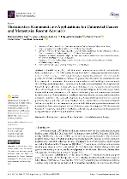Theranostics Nanomedicine Applications for Colorectal Cancer and Metastasis: Recent Advances

Autor
Kasi, Phanindra Babu
Datum vydání
2023Publikováno v
International Journal of Molecular SciencesRočník / Číslo vydání
24 (9)ISBN / ISSN
ISSN: 1661-6596Informace o financování
EU/FP8/856620
MZ0/NU/NU21-03-00506
MZ0/NU/NU21-03-00145
UK/COOP/COOP
MSM//LX22NPO5102
FN/I-FN/I-FNP-04
Metadata
Zobrazit celý záznamKolekce
Tato publikace má vydavatelskou verzi s DOI 10.3390/ijms24097922
Abstrakt
Colorectal cancer (CRC) is the third most common cancer worldwide, and metastatic CRC is a fatal disease. The CRC-affected tissues show several molecular markers that could be used as a fresh strategy to create newer methods of treating the condition. The liver and the peritoneum are where metastasis occurs most frequently. Once the tumor has metastasized to the liver, peritoneal carcinomatosis is frequently regarded as the disease's final stage. However, nearly 50% of CRC patients with peritoneal carcinomatosis do not have liver metastases. New diagnostic and therapeutic approaches must be developed due to the disease's poor response to present treatment choices in advanced stages and the necessity of an accurate diagnosis in the early stages. Many unique and amazing nanomaterials with promise for both diagnosis and treatment may be found in nanotechnology. Numerous nanomaterials and nanoformulations, including carbon nanotubes, dendrimers, liposomes, silica nanoparticles, gold nanoparticles, metal-organic frameworks, core-shell polymeric nano-formulations, and nano-emulsion systems, among others, can be used for targeted anticancer drug delivery and diagnostic purposes in CRC. Theranostic approaches combined with nanomedicine have been proposed as a revolutionary approach to improve CRC detection and treatment. This review highlights recent studies, potential, and challenges for the development of nanoplatforms for the detection and treatment of CRC.
Klíčová slova
colorectal cancer, nanomedicine, theranostics, clinical status, cancer therapy
Trvalý odkaz
https://hdl.handle.net/20.500.14178/1959Licence
Licence pro užití plného textu výsledku: Creative Commons Uveďte původ 4.0 International







